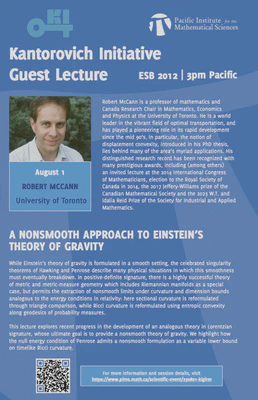Abstract
While Einstein’s theory of gravity is formulated in a smooth setting, the celebrated singularity theorems of Hawking and Penrose describe many physical situations in which this smoothness must eventually breakdown. In positive-definite signature, there is a highly successful theory of metric and metric-measure geometry which includes Riemannian manifolds as a special case, but permits the extraction of nonsmooth limits under curvature and dimension bounds analogous to the energy conditions in relativity: here sectional curvature is reformulated through triangle comparison, while Ricci curvature is reformulated using entropic convexity along geodesics of probability measures.
This lecture explores recent progress in the development of an analogous theory in Lorentzian signature, whose ultimate goal is to provide a nonsmooth theory of gravity. We highlight how the null energy condition of Penrose admits a nonsmooth formulation as a variable lower bound on timelike Ricci curvature.
Event Details
Remote Participants
This talk is hybrid so will be available on zoom. To participate remotely, please register via zoom

Speaker Biography
Robert McCann is a professor of mathematics and Canada Research Chair in Mathematics, Economics and Physics at the University of Toronto. He is a world leader in the vibrant field of optimal transportation, and has played a pioneering role in its rapid development since the mid 90’s. In particular, the notion of displacement convexity, introduced in his PhD thesis, lies behind many of the area’s myriad applications. His distinguished research record has been recognized with many prestigious awards, including (among others) an invited lecture at the 2014 International Congress of Mathematicians, election to the Royal Society of Canada in 2014, the 2017 Jeffery-Williams prize of the Canadian Mathematical Society and the 2023 W.T. and Idalia Reid Prize of the Society for Industrial and Applied Mathematics.